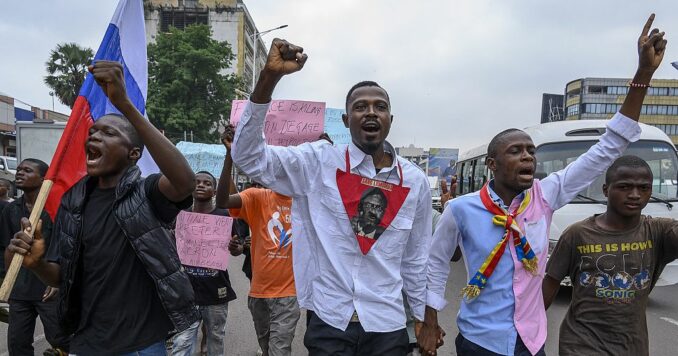From Vilnius to Kinshasa, Macron tries to puff up French imperialism
Lithuania, a new member of NATO on the Baltic Sea, doesn’t have the air force its regime claims it needs. So the French government has sent a squadron of its armed forces’ most advanced fighter planes to allegedly respond to Russian probes of NATO’s air defenses, without any public limits on the length of their deployment.

Congolese in Kinshasa, protest French President Emmanuel Macron’s visit and France’s policy toward Africa, March 1, 2023.
But, judging by its actions, French imperialism’s major concern is what is happening in Africa, where a large number of countries still use French as their official language. The largest such country is the Democratic Republic of the Congo (Congo-Kinshasa) with over 95 million people and nearly 1 million square miles of resource-rich territory.
French businesses and banks have very profitable economic interests in Africa. TotalEnergies SE, the French oil company, depends on Angolan oil and their billions more French investments, both in Francophone and Anglophone countries.
Within the former French colonies, there are deep, massive resentments over the pernicious, vile and catastrophic injuries inflicted by colonialism and its successor neocolonialism.
The French military began the air strikes against Libya in 2011 and helped overthrow the government there, destabilizing much of North Africa and the Sahel, then used the instability as a pretext to intervene in Mali, Côte d’Ivoire, Niger, Chad and other countries.
The French regime’s reeking hypocrisy has been exposed, as it accepted 106,000 Ukrainian refugees in a few months, while tens of thousands of refugees from Africa and the Middle East die year after year while trying to cross the Mediterranean Sea. It has become illegal to help these refugees, and those who survive are hunted down like criminals.
The French state has hardened its reaction against those who oppose France’s support for the U.S. and NATO in the proxy war against Russia in Ukraine.
Of the 45 nations who abstained or were absent from the latest United Nations General Assembly vote against Russia, 23 were African countries. Most of these African countries — except for Algeria, South Africa and Namibia — are among the countries the U.N. lists as the poorest in the world.
French President Emmanuel Macron began a trip to Gabon, Angola, the Republic of Congo (Congo-Brazzaville) and the Democratic Republic of Congo (Congo-Kinshasa) on March 1, to try to undercut this support for Russia.
While Macron posed in Africa, France’s trade unions called for a general strike March 7 and 8 in the ongoing fight to protect the workers’ pensions. The class struggle is alive at home.

